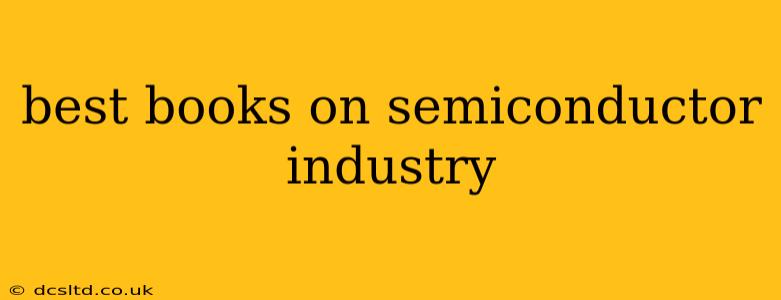The semiconductor industry is a complex and fascinating world, driving innovation across countless technologies. Understanding its intricacies requires more than just surface-level knowledge. This guide delves into the best books available, categorized for different levels of expertise and interests, to help you navigate this crucial sector.
For the Aspiring Semiconductor Professional: Foundational Knowledge
These books provide a solid groundwork for those new to the industry or seeking a comprehensive overview:
1. "Semiconductor Physics and Devices: Basic Principles" by Donald A. Neamen: This textbook is a classic for a reason. It offers a detailed yet accessible explanation of semiconductor physics, covering fundamental concepts essential for understanding how chips are designed and manufactured. It's ideal for students and professionals seeking a strong theoretical base.
2. "Microelectronic Circuits" by Adel S. Sedra and Kenneth C. Smith: Another widely used textbook, this one focuses on the design and operation of integrated circuits. It's excellent for understanding how individual components work together to create larger systems. While technically inclined, its clear explanations make it accessible to a broad audience.
For the Business-Minded: Market Analysis and Industry Trends
Understanding the business side of the semiconductor industry is crucial. These books offer valuable insights:
1. "Chip War: The Fight for the World's Most Critical Technology" by Chris Miller: This recent bestseller provides a geopolitical and historical perspective on the semiconductor industry, exploring its strategic importance in international relations and technological competition. It's a compelling read for those interested in the broader implications of chip technology.
For the Deep Dive: Specific Technologies and Manufacturing Processes
For those seeking more specialized knowledge, these books cover specific aspects of semiconductor technology:
1. "The Innovators: How a Group of Hackers, Geniuses, and Geeks Created the Digital Revolution" by Walter Isaacson: While not solely focused on semiconductors, this book provides a crucial historical context for the development of the technologies that underpin the industry. It illuminates the personalities and innovations that have shaped the modern digital world.
Frequently Asked Questions (FAQ)
What are some good books on semiconductor manufacturing?
While there isn't one single definitive book solely on semiconductor manufacturing, many of the physics and device textbooks mentioned above touch upon manufacturing processes. To gain deeper insight, you'll likely need to search for specialized texts and articles within specific areas like photolithography, etching, or deposition. Look for resources from professional organizations like IEEE or SEMI.
Where can I find books on the history of the semiconductor industry?
Several books offer historical perspectives on the industry, with "Chip War" mentioned above being a prime example. Further research may uncover more specialized historical accounts focusing on specific companies, inventions, or eras.
Are there any books focusing on the future of the semiconductor industry?
Predicting the future is always challenging, but industry publications and reports often offer insights into emerging trends and technologies, such as advanced packaging, new materials, and AI-driven design. These can often be found through professional organizations or market research firms.
What books are best for understanding semiconductor economics?
While there isn’t a singular "economics of semiconductors" book, many business-focused texts on the tech industry touch upon the economic aspects of semiconductor production and markets. Analyzing market reports from firms like Gartner or IDC provides current economic data and trends.
This curated list offers a starting point for exploring the world of semiconductors. Remember that the industry is constantly evolving, so supplementing these books with current industry news, journals, and white papers will ensure you remain up-to-date. The best approach is to start with a foundational text and then delve into more specialized areas based on your interests and career goals.
